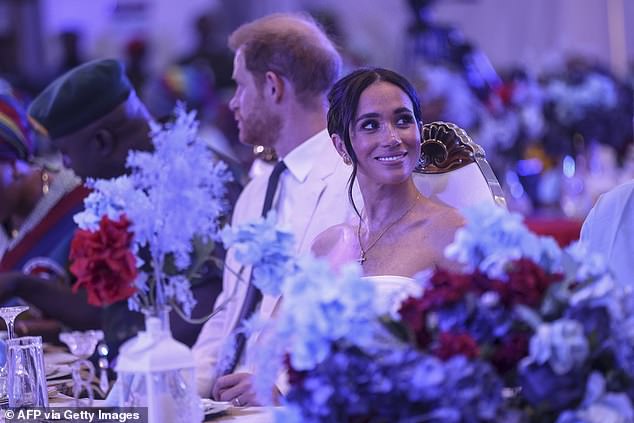In a notable shift from her past engagements alongside Prince Harry, Meghan Markle co-hosted a Women in Leadership event in Abuja, Nigeria, with Dr. Ngozi Okonjo-Iweala, the Director-General of the World Trade Organization.
However, her arrival was overshadowed by several missteps that raised eyebrows and sparked criticism regarding her cultural awareness and sensitivity.
Almost an hour late to the event, Meghan’s tardiness was seen as disrespectful not only to the organizers but also to the attendees who had gathered to hear her speak.
In professional settings, punctuality is a sign of respect, and her delay seemed to disregard this fundamental principle.
It set an unfortunate tone for what was supposed to be an empowering occasion.
Adding fuel to the fire, Meghan’s choice of attire—a dress featuring spaghetti straps that revealed more skin than is typically acceptable in a conservative Muslim context—drew criticism.
This choice highlighted a perceived lack of understanding or consideration for local customs and norms, raising questions about her empathy and awareness of cultural sensitivities.
As she took the stage, the audience’s reception was tepid at best.
The applause was sparse, contrasting sharply with the enthusiastic cheers given to her co-speaker.
It appeared that only one person, possibly a hired supporter, clapped excessively in an attempt to mask the lack of genuine enthusiasm from the crowd.
This awkward moment underscored the disconnect between Meghan’s self-perception and the reality of her reception.
Yet, the lackluster entrance was merely the beginning of a disappointing performance.
Despite being billed as a woman in leadership, Meghan offered little in terms of expertise or substantial contributions.
Instead, she shared anecdotes about her children, Archie and Lilibet, which did little to resonate with the audience or address the pressing issues facing women in leadership roles today.
Her narrative about balancing motherhood and career felt disingenuous, especially considering her privileged lifestyle, complete with staff and nannies to help with childcare.
This stark contrast highlighted her disconnect from the realities faced by many working mothers who juggle similar responsibilities without such resources.
During the panel discussion, Meghan’s comments lacked depth and relevance.
Rather than engaging in a meaningful dialogue about women in leadership, she seemed more focused on her personal experiences.
Her attempts to portray herself as a leader fell flat, lacking any significant achievements or evidence of her capabilities in this area.
In a moment that further illustrated her disconnect, Meghan thanked Nigerians for welcoming her to “my country.”
This statement struck many as out of touch and failed to resonate with the audience.
Her efforts to align herself with the local culture came off as forced, revealing a focus on her public image rather than fostering authentic connections.
When asked about discovering her 43% Nigerian ancestry through a genealogy test, Meghan’s immediate reaction was to call her mother for confirmation.
While she described the experience as eye-opening, it felt like a fleeting moment of connection rather than a genuine exploration of her heritage and what it means to belong to a culture.
Ultimately, Meghan’s participation in the event did little to inspire confidence or admiration.
Her contributions were overshadowed by a sense of self-aggrandizement and empty platitudes.
The stark contrast between her inflated self-image and her actual impact left many questioning her role as a representative of women in leadership.
This event in Abuja serves as a reminder that genuine leadership requires more than just a title or platform; it demands a deep understanding of cultural nuances and the ability to connect meaningfully with diverse audiences.
Meghan’s experience highlights the importance of being grounded and aware, qualities essential for anyone aspiring to lead effectively in a global context.
Related Stories

